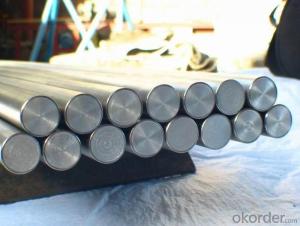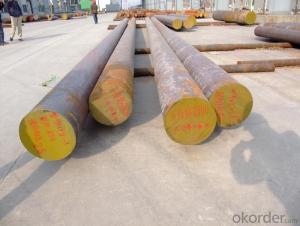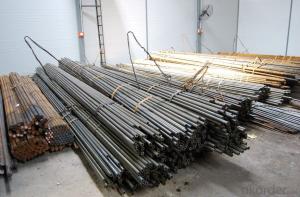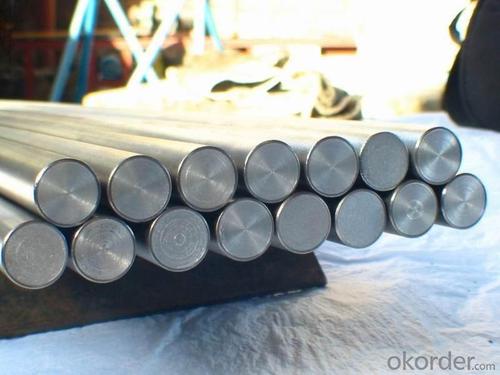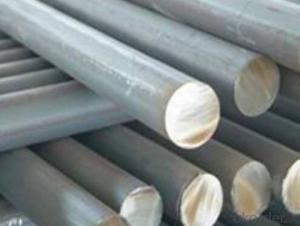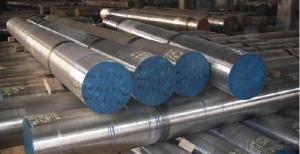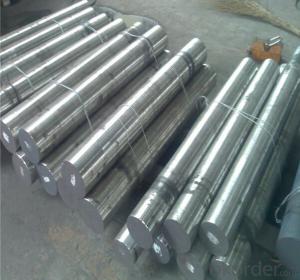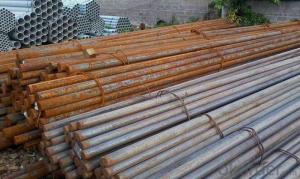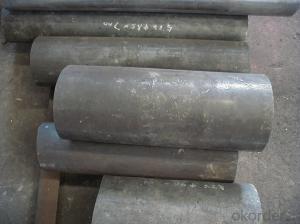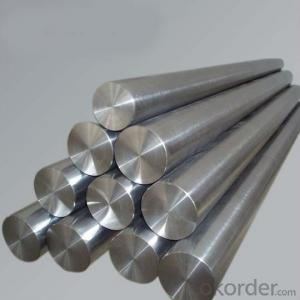Alloy Tool Steel,Alloy Steel Bar Steel Material SKD61
- Loading Port:
- China main port
- Payment Terms:
- TT OR LC
- Min Order Qty:
- 30 m.t.
- Supply Capability:
- 10000 m.t./month
OKorder Service Pledge
Quality Product, Order Online Tracking, Timely Delivery
OKorder Financial Service
Credit Rating, Credit Services, Credit Purchasing
You Might Also Like
Specification
Type:
Alloy Steel
Shape:
Steel Round Bar
Alloy Tool Steel,Alloy Steel Bar Steel Material SKD61
Product information:
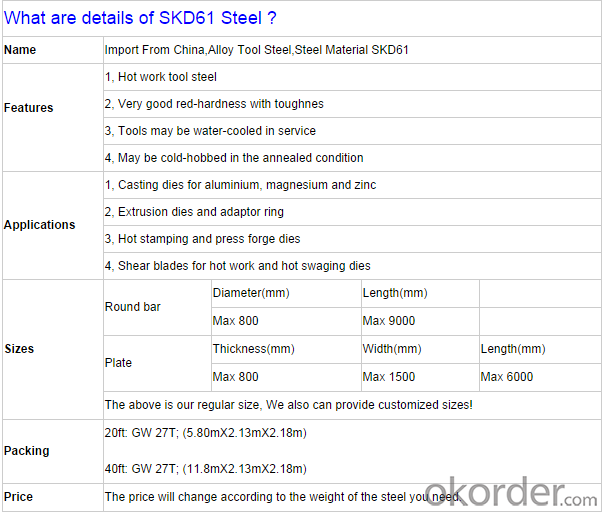
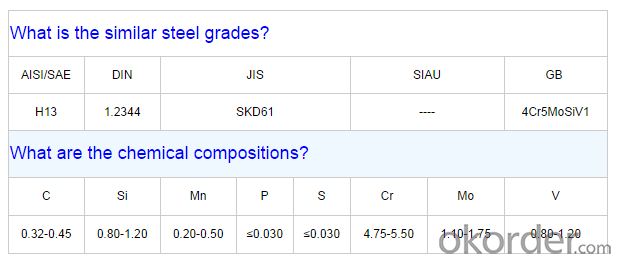
Product show
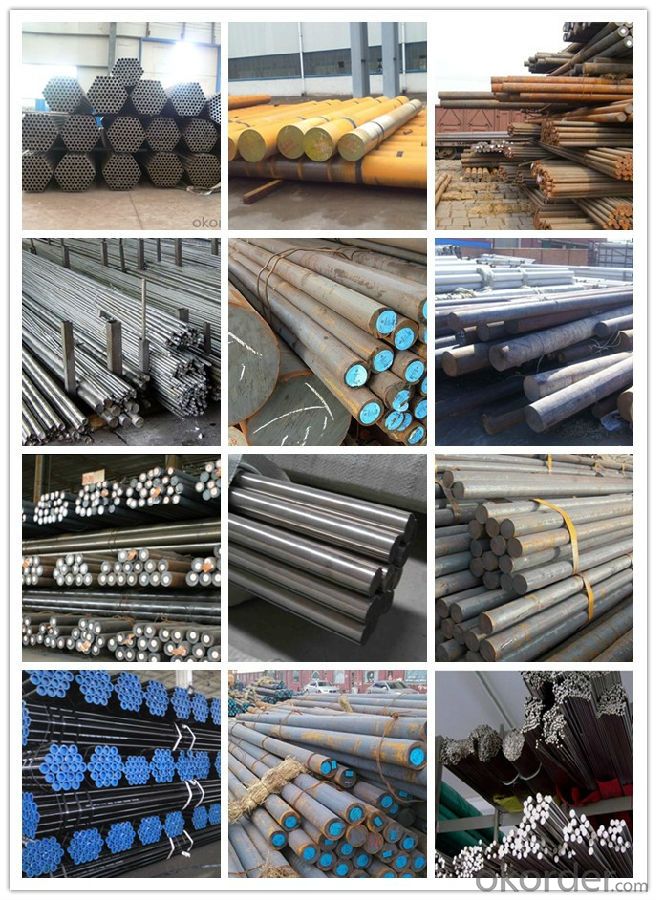
Workshop show
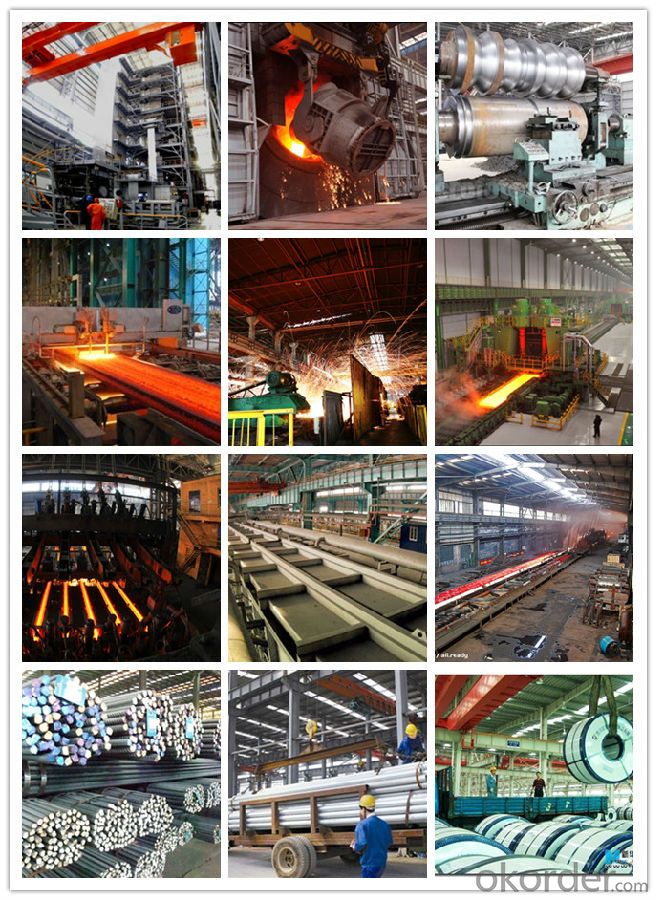
Our service:

- Q: How does special steel contribute to the automotive exhaust system industry?
- Special steel plays a crucial role in the automotive exhaust system industry by offering several significant contributions. Firstly, special steel, such as stainless steel, is highly resistant to corrosion, which is a common issue faced by exhaust systems due to the exposure to high temperatures and corrosive gases. This corrosion resistance ensures the longevity and durability of the exhaust system, reducing the need for frequent replacements and repairs. Moreover, special steel possesses excellent heat resistance properties. The exhaust system operates under extreme temperatures, and special steel can withstand these conditions without undergoing deformation or structural damage. This ability to handle high temperatures ensures that the exhaust system functions efficiently and maintains its performance over an extended period. In addition, special steel offers exceptional strength and durability. The exhaust system is subjected to constant vibrations, impacts, and stress due to road conditions and engine movements. Special steel's high strength and toughness enable the exhaust system to withstand these forces, preventing premature failures and ensuring the safety and reliability of the vehicle. Furthermore, special steel allows for the design and manufacturing of complex and lightweight exhaust system components. With advancements in steel technology, manufacturers can create intricate shapes and thin-walled structures, reducing the overall weight of the exhaust system. This weight reduction contributes to improved fuel efficiency and vehicle performance, as it reduces the overall load on the engine. Lastly, special steel provides the automotive industry with the flexibility to meet increasingly stringent emission regulations. By utilizing special steel in the exhaust system, manufacturers can incorporate catalytic converters and other emission control devices effectively. These devices play a vital role in reducing harmful emissions, such as carbon monoxide, nitrogen oxides, and particulate matter, helping vehicles meet environmental standards. In conclusion, special steel is an essential component in the automotive exhaust system industry. Its corrosion resistance, heat resistance, strength, and lightweight properties contribute to the longevity, reliability, and performance of the exhaust system. Moreover, special steel enables compliance with emission regulations, ensuring that vehicles are environmentally friendly. Overall, special steel plays a critical role in enhancing the efficiency and sustainability of the automotive exhaust system industry.
- Q: How are titanium alloys used in the medical industry?
- Titanium alloys are widely used in the medical industry due to their unique properties such as high strength, biocompatibility, and corrosion resistance. They are commonly used in medical implants, such as joint replacements, dental implants, and bone plates. These alloys promote better bone integration and reduce the risk of rejection or infection, providing patients with long-lasting and effective medical solutions. Additionally, titanium alloys are also used in surgical instruments and equipment, as they are lightweight and durable, enabling precise and efficient procedures.
- Q: What are the main applications of special steel in the power transmission industry?
- Special steel is used in various applications within the power transmission industry. Some of the main applications include manufacturing of power transmission line towers, transmission line conductors, and high-voltage insulators. Special steel is also used in the production of power transmission cables, transformers, and other critical components, ensuring efficient and reliable electricity transmission.
- Q: What are the different coating techniques used for special steel?
- Some of the different coating techniques used for special steel include hot-dip galvanizing, electroplating, powder coating, and metallizing.
- Q: What are the different non-destructive testing methods used for special steel?
- Some of the common non-destructive testing methods used for special steel include ultrasonic testing, magnetic particle testing, liquid penetrant testing, radiographic testing, and eddy current testing. These methods allow for the detection of internal and surface defects in the steel without causing any damage or alteration to the material.
- Q: How is tool steel used in the manufacturing of molds and dies?
- Tool steel is used in the manufacturing of molds and dies due to its exceptional hardness, wear resistance, and toughness. It allows for the creation of precise and durable molds and dies that can withstand the high pressures and temperatures involved in various manufacturing processes. Tool steel also provides excellent dimensional stability, ensuring the accuracy and consistency of the final products.
- Q: What are the different international trade regulations for special steel?
- There are several international trade regulations that apply to special steel, which is a type of steel that is produced for specific applications or industries. These regulations aim to ensure fair trade practices, protect domestic industries, and promote safety standards. One of the primary international trade regulations for special steel is the World Trade Organization (WTO) agreements. The WTO sets rules for global trade, including the General Agreement on Tariffs and Trade (GATT) and the Agreement on Safeguards. These agreements govern issues such as tariffs, non-tariff barriers, and safeguard measures that may be imposed on special steel imports. Another significant regulation is the Harmonized System (HS) codes. HS codes are a standardized system of names and numbers used to classify traded products. Special steel is assigned specific HS codes, which help customs authorities determine the applicable duties and regulations for these products during import or export. Additionally, regional trade agreements (RTAs) play a role in regulating international trade in special steel. RTAs are agreements between countries or regions that reduce trade barriers and promote economic integration. Examples include the North American Free Trade Agreement (NAFTA), the European Union (EU), and the Comprehensive and Progressive Agreement for Trans-Pacific Partnership (CPTPP). These agreements may include provisions related to tariffs, technical standards, and trade facilitation for special steel. Furthermore, some countries may impose specific regulations on the import or export of special steel. These regulations could include licensing requirements, quality standards, safety certifications, or restrictions on certain types of steel. It is essential for businesses involved in the trade of special steel to be aware of these country-specific regulations to ensure compliance. Overall, international trade regulations for special steel encompass a range of agreements, codes, and country-specific rules. Adhering to these regulations is crucial for companies engaged in the global trade of special steel to ensure compliance, avoid penalties, and maintain fair trade practices.
- Q: How does special steel contribute to the construction of infrastructure projects?
- Special steel plays a crucial role in the construction of infrastructure projects by providing enhanced strength, durability, and resistance to corrosion. It is commonly used in critical structural components such as beams, columns, and reinforcement bars, ensuring the stability and longevity of buildings, bridges, and other infrastructure. Additionally, special steel alloys offer flexibility in design, making it possible to create structures that are lighter and more cost-effective without compromising safety or structural integrity.
- Q: How does special steel perform in high-vibration applications?
- Special steel is known for its excellent performance in high-vibration applications. Its unique composition and properties make it highly resistant to the effects of vibration, ensuring optimal performance and durability in such environments. One of the key features of special steel is its high tensile strength. This strength allows it to withstand the forces and stresses generated by vibration without undergoing deformation or failure. This property is vital in high-vibration applications, where constant movement and oscillation can subject materials to significant stress. Moreover, special steel exhibits exceptional fatigue strength, meaning it can endure repeated cycles of stress and vibration without compromising its structural integrity. This makes it ideal for applications that involve continuous or cyclic vibration, such as machinery, equipment, and structures subjected to dynamic loads. Additionally, special steel possesses excellent damping properties. Damping refers to the ability of a material to absorb and dissipate energy generated by vibrations. Special steel's superior damping characteristics help reduce the magnitude and duration of vibrations, minimizing the impact on the surrounding components and structures. This contributes to overall system stability and reduces the risk of fatigue or premature failure. Furthermore, special steel is often engineered to have high resistance to corrosion and wear. This resistance ensures that the material remains robust and reliable even in harsh environments where vibration-induced corrosion or erosion may occur. By maintaining its protective coating and integrity, special steel can effectively withstand the challenges posed by high-vibration applications. In summary, special steel performs exceptionally well in high-vibration applications due to its high tensile strength, fatigue resistance, damping properties, and corrosion/wear resistance. Its combination of these properties ensures optimal performance, longevity, and safety in environments characterized by significant vibration and dynamic loads.
- Q: What are the requirements for special steel used in wind turbines?
- The requirements for special steel used in wind turbines typically include high strength and durability, resistance to corrosion and fatigue, excellent weldability, and good magnetic properties. Additionally, the steel should possess good formability and machinability to aid in the manufacturing process of turbine components.
Send your message to us
Alloy Tool Steel,Alloy Steel Bar Steel Material SKD61
- Loading Port:
- China main port
- Payment Terms:
- TT OR LC
- Min Order Qty:
- 30 m.t.
- Supply Capability:
- 10000 m.t./month
OKorder Service Pledge
Quality Product, Order Online Tracking, Timely Delivery
OKorder Financial Service
Credit Rating, Credit Services, Credit Purchasing
Similar products
Hot products
Hot Searches
Related keywords
